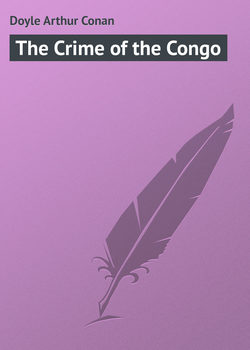The Crime of the Congo

Реклама. ООО «ЛитРес», ИНН: 7719571260.
Оглавление
Doyle Arthur Conan. The Crime of the Congo
PREFACE
INTRODUCTION
I. HOW THE CONGO FREE STATE CAME TO BE FOUNDED
II. THE DEVELOPMENT OF THE CONGO STATE
III. THE WORKING OF THE SYSTEM
IV. FIRST FRUITS OF THE SYSTEM
V. FURTHER FRUITS OF THE SYSTEM
VI. VOICES FROM THE DARKNESS
VII. CONSUL ROGER CASEMENT’S REPORT
VIII. KING LEOPOLD’S COMMISSION AND ITS REPORT
IX. THE CONGO AFTER THE COMMISSION
X. SOME CATHOLIC TESTIMONY AS TO THE CONGO
XI. THE EVIDENCE UP TO DATE
XII. THE POLITICAL SITUATION
XIII. SOME CONGOLESE APOLOGIES
XIV. SOLUTIONS
APPENDIX. NOTE I – THE CHICOTTE
Отрывок из книги
I am convinced that the reason why public opinion has not been more sensitive upon the question of the Congo Free State, is that the terrible story has not been brought thoroughly home to the people. Mr. E. D. Morel has done the work of ten men, and the Congo Reform Association has struggled hard with very scanty means; but their time and energies have, for the most part, been absorbed in dealing with each fresh phase of the situation as it arose. There is room, therefore, as it seemed to me, for a general account which would cover the whole field and bring the matter up to date. This account must necessarily be a superficial one, if it is to be produced at such a size and such a price, as will ensure its getting at that general public for which it has been prepared. Yet it contains the essential facts, and will enable the reader to form his own opinion upon the situation.
Should he, after reading it, desire to help in the work of forcing this question to the front, he can do so in several ways. He can join the Congo Reform Association (Granville House, Arundel Street, W. C.). He can write to his local member and aid in getting up local meetings to ventilate the question. Finally, he can pass this book on and purchase other copies, for any profits will be used in setting the facts before the French and German public.
.....
It is not necessary to record in this statement the whole of the provisions of the Berlin Congress. Two only will suffice, as they are at the same time the most important and the most flagrantly abused. The first of these (which forms the fifth article of the agreement) proclaims that “No Power which exercises sovereign rights in the said regions shall be allowed to grant therein either monopoly or privilege of any kind in commercial matters.” No words could be clearer than that, but the Belgian representatives, conscious that such a clause must disarm all opposition, went out of their way to accentuate it. “No privileged situation can be created in this respect,” they said. “The way remains open without any restriction to free competition in the sphere of commerce.” It would be interesting now to send a British or German trading expedition up the Congo in search of that free competition which has been so explicitly promised, and to see how it would fare between the monopolist Government and the monopolist companies who have divided the land between them. We have travelled some distance since Prince Bismarck at the last sitting of the Conference declared that the result was “to secure to the commerce of all nations free access to the centre of the African Continent.”
More important, however, is Article VI., both on account of the issues at stake, and because the signatories of the treaty bound themselves solemnly, “in the name of Almighty God,” to watch over its enforcement. It ran: “All the Powers exercising sovereign rights or influence in these territories pledge themselves to watch over the preservation of the native populations and the improvement of their moral and material conditions of existence, and to work together for the suppression of slavery and of the slave trade.” That was the pledge of the united nations of Europe. It is a disgrace to each of them, including ourselves, the way in which they have fulfilled that oath. Before their eyes, as I shall show in the sequel, they have had enacted one long, horrible tragedy, vouched for by priests and missionaries, traders, travellers and consuls, all corroborated, but in no way reformed, by a Belgium commission of inquiry. They have seen these unhappy people, who were their wards, robbed of all they possessed, debauched, degraded, mutilated, tortured, murdered, all on such a scale as has never, to my knowledge, occurred before in the whole course of history, and now, after all these years, with all the facts notorious, we are still at the stage of polite diplomatic expostulations. It is no answer to say that France and Germany have shown even less regard for the pledge they took at Berlin. An individual does not condone the fact that he has broken his word by pointing out that his neighbour has done the same.
.....